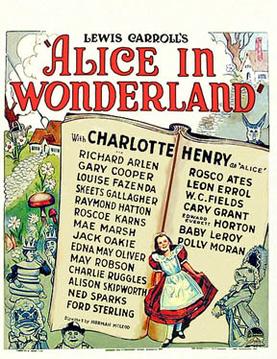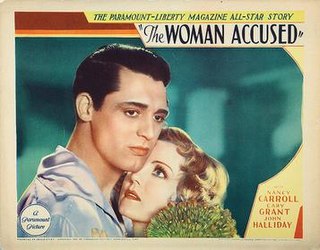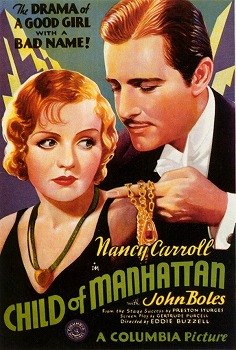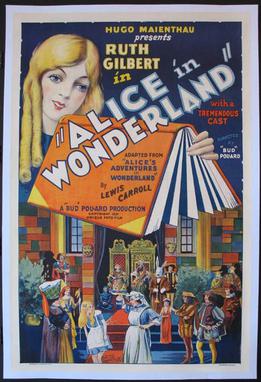
Cary Grant was an English and American actor. Known for his Mid-Atlantic accent, debonair demeanor, lighthearted approach to acting, and sense of comic timing, he was one of classic Hollywood's definitive leading men. He was nominated twice for the Academy Award, received an Academy Honorary Award in 1970, and received the Kennedy Center Honor in 1981. He was named the second greatest male star of the Golden Age of Hollywood by the American Film Institute in 1999.

Alice in Wonderland is a 1933 American pre-Code fantasy film adapted from the novels by Lewis Carroll. The film was produced by Paramount Pictures, featuring an all-star cast. It is all live action, except for the Walrus and The Carpenter sequence, which was animated by Harman-Ising Studio. The film was seen by Walt Disney, and inspired him to create his company's 1951 animated adaptation.

The Bishop's Wife is a 1947 American Christmas romantic fantasy comedy film directed by Henry Koster, starring Cary Grant, Loretta Young and David Niven. The plot is about an angel who helps a bishop with his problems. The film was adapted by Leonardo Bercovici and Robert E. Sherwood from the 1928 novel of the same name by Robert Nathan.

George Randolph Scott was an American film actor, whose Hollywood career spanned from 1928 to 1962. As a leading man for all but the first three years of his cinematic career, Scott appeared in dramas, comedies, musicals, adventures, war, horror and fantasy films, and Westerns. Out of his more than 100 film appearances, more than 60 of them were Westerns.

Nancy Carroll was an American actress. She started her career in Broadway musicals and then became an actress in sound films and was in many films from 1927 to 1938. She was then in television roles from 1950 to 1963. She received a star on the Hollywood Walk of Fame on February 8, 1960.

Min and Bill is a 1930 American pre-Code comedy-drama film, directed by George W. Hill and starring Marie Dressler and Wallace Beery. Adapted by Frances Marion and Marion Jackson from Lorna Moon's 1929 novel Dark Star, the film tells the story of dockside innkeeper Min's tribulations as she tries to protect the innocence of her adopted daughter, Nancy, while loving and fighting with boozy fisherman Bill, who resides at the inn. The picture was a runaway hit. In 1931, the studio released a Spanish-language version of Min and Bill, La fruta amarga, directed by Arthur Gregor and starring Virginia Fábregas and Juan de Landa.

This Is the Night is a 1932 American pre-Code comedy film directed by Frank Tuttle, and starring Lili Damita, Charles Ruggles, Roland Young, Thelma Todd, and Cary Grant in his film debut. It was made by Paramount Pictures.
"Isn't It Romantic?" is a popular song and part of the Great American Songbook. The music was composed by Richard Rodgers, with lyrics by Lorenz Hart. It has a 32-bar chorus in A–B–A–C form. Alec Wilder, in his book American Popular Song: The Great Innovators 1900–1950, calls it "a perfect song."

Blonde Venus is a 1932 American pre-Code drama film starring Marlene Dietrich, Herbert Marshall and Cary Grant. It was produced, edited and directed by Josef von Sternberg from a screenplay by Jules Furthman and S. K. Lauren, adapted from a story by Furthman and von Sternberg. The original story "Mother Love" was written by Dietrich herself. The musical score was by W. Franke Harling, John Leipold, Paul Marquardt and Oscar Potoker, with cinematography by Bert Glennon.

The Woman Accused is a 1933 American pre-Code drama film directed by Paul Sloane and starring Nancy Carroll and Cary Grant as a young engaged couple on a sea cruise, with the woman being implicated in the death of her former lover. The supporting cast includes Jack La Rue in a sequence opposite Grant in which the latter violently whips him.

Lilian Bond was an English-American actress based in the United States.
Virginia Randolph Cary was an American writer. She was the author of Letters on Female Character, Addressed to a Young Lady, on the Death of Her Mother (1828), an influential advice book.

The musical short can be traced back to the earliest days of sound films.

Child of Manhattan is a 1933 American pre-Code melodrama film based on the play Child of Manhattan by Preston Sturges, which was presented on Broadway in 1932. The film was directed by Edward Buzzell and written for the screen by Gertrude Purcell, and stars Nancy Carroll, star of musical comedies at Paramount, John Boles, and cowboy star Charles "Buck" Jones.

Broken Lullaby is a 1932 American pre-Code drama film directed by Ernst Lubitsch and released by Paramount Pictures. The screenplay by Samson Raphaelson and Ernest Vajda is based on the 1930 play L'homme que j'ai tué by Maurice Rostand and its 1931 English-language adaptation, The Man I Killed, by Reginald Berkeley.

Alice in Wonderland (1931) is an independently made black-and-white Pre-Code American film based on Lewis Carroll's 1865 novel Alice's Adventures in Wonderland, directed by Bud Pollard, produced by Hugo Maienthau, and filmed at Metropolitan Studios in Fort Lee, New Jersey.

Merrily We Go to Hell is a 1932 pre-Code film directed by Dorothy Arzner, and starring Fredric March and Sylvia Sidney. The supporting cast features a prominent early appearance by Cary Grant, billed ninth in the cast but with a larger part than this would suggest. The picture's title is an example of the sensationalistic titles that were common in the pre-Code era. Many newspapers refused to publicize the film because of its racy title. The title is a line March's character says while making a toast.

Listen Lester is a 1924 black-and-white silent film drama/comedy film directed by William A. Seiter, with a screen adaptation by Lewis Milestone and William A. Seiter, based upon the 1918 stage play of the same name. Released by Universal Pictures on May 20, 1924, the film stars Louise Fazenda and Harry Myers.

Restless is a 2012 British TV adaptation of William Boyd's espionage novel Restless (2006). Directed by Edward Hall, the film features Hayley Atwell, Rufus Sewell, Michelle Dockery, Michael Gambon and Charlotte Rampling. The two parts first aired on 27 and 28 December 2012 on BBC One.

















